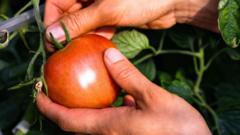An investigation by the BBC raises grave concerns about the presence of Chinese tomatoes in 'Italian' supermarket brands, attributing their cultivation to forced labour conditions involving Uyghur workers. Retailers have disputed the claims while confirming their commitment to ethical sourcing.
UK Supermarkets Face Allegations of Using Chinese Forced Labour Tomatoes

UK Supermarkets Face Allegations of Using Chinese Forced Labour Tomatoes
Investigative reports reveal that 'Italian' tomato purees sold in the UK may contain tomatoes sourced from Chinese farms linked to forced labour practices in Xinjiang.
Recent investigative work has uncovered alarming revelations regarding popular 'Italian' tomato purees sold in supermarkets across the UK. The BBC has reported that these purees may potentially contain tomatoes grown and harvested in China under conditions of forced labour, particularly in the Xinjiang region.
While some products explicitly label themselves as "Italian," others describe themselves as containing "Italian grown tomatoes," creating an image of authenticity. A total of 17 products involving major retailers, predominantly own-brand offerings, have been found likely to include Chinese tomatoes, as per testing commissioned by the BBC.
The Xinjiang region is notorious for its human rights violations, where the UN has alleged that over a million Uyghurs and other Muslim minorities have been subjected to forced labour in detention facilities. China, while denying these allegations, claims that workers' rights are safeguarded by its laws. In the meantime, accounts from individuals who have experienced or witnessed forced labour in Xinjiang’s tomato fields reveal severe abuses, raising ethical questions for consumers relying on these products.
Using advanced testing methods to analyze trace elements, the investigation revealed distinct profiles that allowed researchers to ascertain the origins of the tomatoes in question. Among 64 tomato puree products tested, 17 were identified to contain Chinese tomatoes, 10 of which were linked to the Italian processing firm, Antonio Petti.
The supermarkets affected have vehemently denied these findings. Tesco, for instance, announced an immediate suspension of supply, while other retailers have conducted their own investigations and contested the BBC's testing methods. Contrarily, Lidl has acknowledged the inclusion of Chinese tomatoes in specific products sold in the previous year, citing supply issues.
With the increasing scrutiny surrounding the use of forced labour in global supply chains, there is a growing urgency for retailers to ensure ethical sourcing practices. Experts warn that current self-regulation is insufficient to prevent potential exploitation, and steps towards stricter legislation in the EU may further necessitate safeguarding measures across the UK market.
The overarching concern remains: consumers should remain vigilant about the true cost of low-priced food and the unseen human toll that may accompany it. The commitment to transparency and ethical sourcing is paramount as consumers navigate their purchasing choices amid these complex revelations surrounding international supply chains.

















